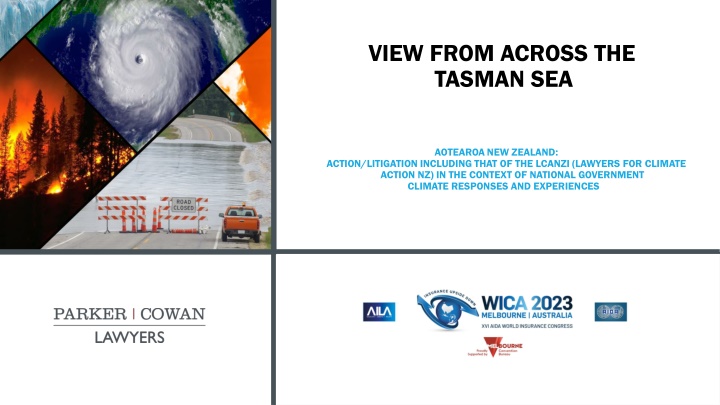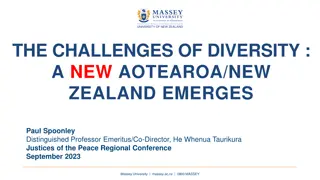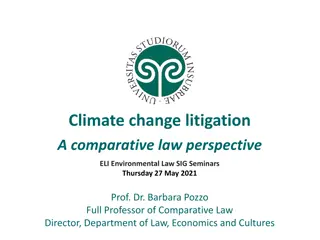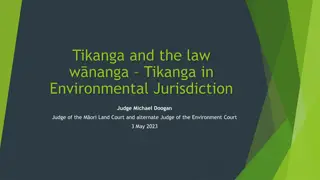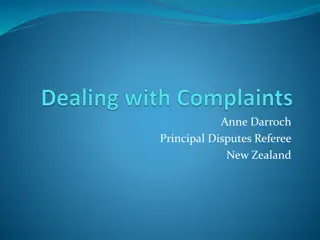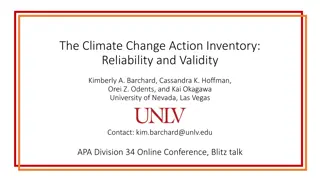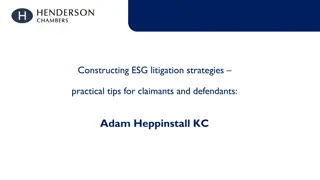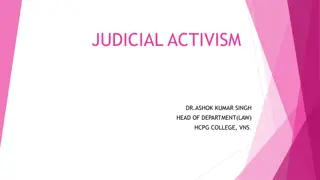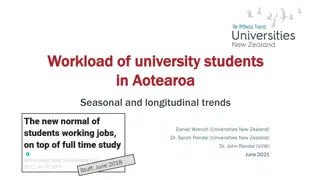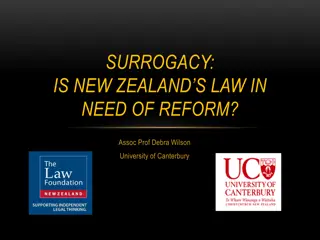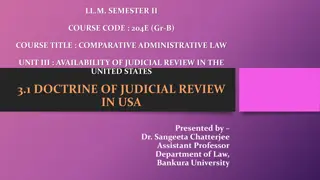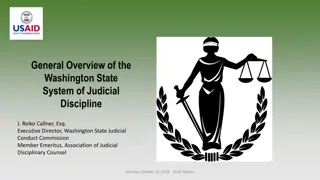Climate Change Litigation in Aotearoa/New Zealand: LCANZI Action and Judicial Review
The Lawyers for Climate Action NZ Incorporated (LCANZI) are actively involved in climate change litigation in Aotearoa/New Zealand, including challenging government decisions related to climate responses. A notable case involved a judicial review against Auckland Transport, where the High Court refused the challenge due to limitations in the judicial review process. Another case involved LCANZI challenging advice from the Climate Change Commission, highlighting concerns about New Zealand's progress towards emission reduction goals. While the judicial review was unsuccessful, it raised awareness about the need for stronger efforts to meet international climate targets.
Download Presentation

Please find below an Image/Link to download the presentation.
The content on the website is provided AS IS for your information and personal use only. It may not be sold, licensed, or shared on other websites without obtaining consent from the author.If you encounter any issues during the download, it is possible that the publisher has removed the file from their server.
You are allowed to download the files provided on this website for personal or commercial use, subject to the condition that they are used lawfully. All files are the property of their respective owners.
The content on the website is provided AS IS for your information and personal use only. It may not be sold, licensed, or shared on other websites without obtaining consent from the author.
E N D
Presentation Transcript
VIEW FROM ACROSS THE TASMAN SEA AOTEAROANEW ZEALAND: ACTION/LITIGATION INCLUDING THAT OF THE LCANZI (LAWYERS FOR CLIMATE ACTION NZ) IN THE CONTEXT OF NATIONAL GOVERNMENT CLIMATE RESPONSES AND EXPERIENCES
JUDICIAL REVIEW AS A TOOL FOR CLIMATE CHANGE LAWYERS Judicial review as a tool for climate change lawyers Lawyers for Climate Action NZ Incorporated (LCANZI) All Aboard Aotearoa Incorporated v Auckland Transport All Aboard Aotearoa Incorporated v Auckland Transport, the Regional Transport Committee for Auckland, Auckland , the Regional Transport Committee for Auckland, Auckland Council Council (April 2022) Challenge to decisions made by the Regional Transport Committee / the Planning Committee and Auckland Transport s Board as not being properly informed by factors arising from the IPCC report (October 2018) seeking to confine the increase in global warming to 1.5 C above pre-industrial levels, contrary to the Government of New Zealand s ratification of the UN Framework Convention on Climate Change (Paris Agreement) to pursue the 1.5 C figure, whilst committing to holding any increase to 2 C.
Outcome: Judicial review was refused in that case, and the High Court held: The problem with the [All Aboard] approach is that the issue is only considered through one lens it does not recognise the potential impacts of their proposals on the system overall. Nor does it recognise the constraints inherent in the process of developing the [Plan]. (per Venning J) Notable was the Judge s acceptance of the submission by the transport authority respondents that All Aboard s challenge involved the evaluation of political, social and economic choices which the legislation has vested in the statutory decision-maker ; and found that the statutory wording did not support that challenge. Limitations of the JR process.
LCANZI v THE CLIMATE CHANGE COMMISSION/MINISTER FOR CLIMATE CHANGE (Nov 2022) Legislation enacted by Parliament to develop and implement policies as part of the global effort to limit temperature increase to 1.5 C (Climate Change Response (Zero Carbon) Amendment Act 2019), including New Zealand s net emissions GHG target of zero by 2050. The judicial review challenged the advice, the first of its kind, given by the Commission to the Government about its progress towards emission reduction and adaptation goals. LCANZI challenged that advice as being based on illogical or mathematical error, namely in comparison of the Commission s modelling with that carried out by the Intergovernmental Panel on Climate Change in a 2018 report. The judicial review was unsuccessful, but the Judge accepted LCANZI s key concern that neither the advice or budget s advice provided by the Commission to the Government put the Government on track to reduce domestic net emissions by 2030 as required by the IPCC Global Pathways: New Zealand is not working to keep up with its international 1.5 C target obligations.
LCANZI AND THE EMISSIONS TRADING SCHEME The Climate Change Response Act 2002 requires volume and price settings to be made annually for the five years ahead for the Emissions Trading Scheme created thereunder. In December 2022, the Government rejected the advice of the Commission and recommendations of the Minister about what those volumes and price settings should be and made available at low prices an additional 35 million units over the next five years. LCANZI applied for judicial review in May 2023 claiming that in overriding those recommendations the Government failed to address whether the settings were in accordance with the emissions budget and any NDC (Nationally Determined Contributions) (LCNZI v Minister for Climate Change (July 2023)) LCNZI v Minister for Climate Change (July 2023)). LCANZI sought a declaration from the Court that the regulations were inconsistent with the CCRAct and sought an order that regulations be binned and redrawn. Bronwyn Carruthers KC, President of LCANZI, said at the time: The ETS is supposed to act like a tether on our emissions. But Cabinet signalled that whenever tension starts to go on it will throw out more rope. Unsurprisingly, the price of ETS units has collapsed following the December decision. Outcome: a refreshing admission by the Government which resulted in a consent order and the Regulations were redrafted almost immediately, an outcome to the credit of LCANZI but also the Government.
FUNDAMENTAL CHALLENGES TO GOVERNMENTAL LEGISLATION Held v State of Montana Held v State of Montana, August 2023 Based on constitutional rights. The Montana Constitution. Montana Environmental Policy Act. Contrast with our lack of written constitution. New Zealand Bill of Rights Act, Section 8: Right not to be deprived of life No one shall be deprived of life except on such grounds as are established by law and are consistent with the principles of fundamental justice. Life: Meaning as to simply being alive, a right to live, versus a right to quality of life.
